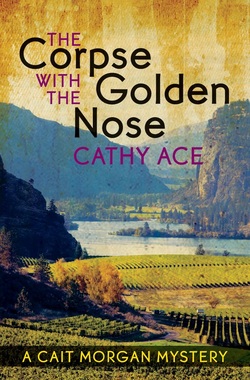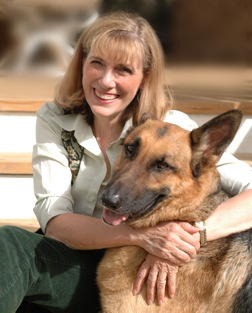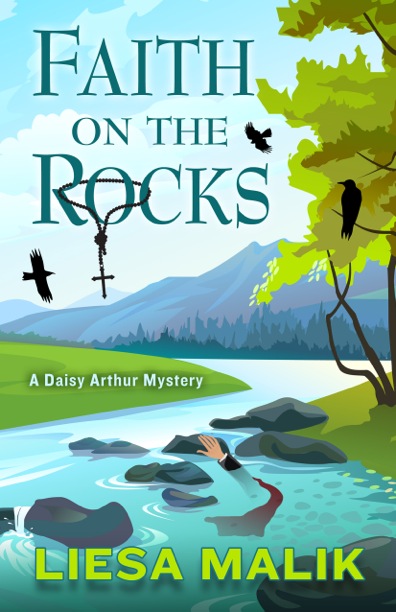|
My guest today is author Liesa Malik. The first novel in her amateur sleuth mystery series is titled Faith on the Rocks - A Daisy Arthur Mystery. The second novel in her series, Sliced Vegetarian, is set for release in the summer of 2015. Liesa shares her experiences and advice on how to Make the Most of Your Critique Group Experience. By the way, that handsome fellow sharing the spotlight in Liesa's author photo is Prophet. In meeting people for the first time, I am often exposed to a wistful look and words to the effect, "I would like to write a book—one day . . ." I suspect people are hoping I'm going to tell them something like, "Writing a book is so easy! You should sit down and write one tomorrow. It'll only take a few hours to type out. You'll be published in no time. Then we'll waltz off with a six-figure advance to go get our nails polished together." But, to be honest, writing is very hard, time-consuming, and sometimes thankless work. Authors are continually in need of learning and re-learning their craft. Advances are small. You're often left wondering why you decided to become an author anyhow. All I can say is thank goodness for my critique group. These days, I think you see a lot of critique groups and writing buddies showing up on the acknowledgement pages of novels for good reason. I have been a part of Littleton Writers, a critique group of the Rocky Mountain Fiction Writers for about ten years, and I can honestly say that I wouldn't have had a hope of publication without my terrific colleagues. Being part of a critique group is, to me, one of the best ways for a writer to grow. If you're willing to be a thoughtful recipient of criticisms toward your writing, you'll grow faster and faster. So, if you're going to write that next best-selling novel, how can you make the most of your critique group experience? Here are some thoughts: · Attitude Is Everything. Well, maybe not everything, but it is certainly important. The aspiring professional is willing to listen and apply edits when she hears a particular criticism repeated from around her group. The dreamer considers her words "golden," and is rigid in the need to keep them as they are. · Silence Works. Yes, you can argue, explain, and tell your critique group colleagues that what they read wasn't what you intended, but in the end you need to realize you cannot visit the home of every reader to "explain" what they may have missed. Sit back, relax, and say "thank you." Then, if you think the criticism is way off base, pitch the comments once you get home. It's pretty simple. · Be Consistent. We don't take attendance in our critique group, but I've noticed that those who make a commitment to show up regularly tend to have more work completed in a year, and more success with contests and agents than those who come "when the Muse inspires them." Even if you don't have anything new to share, you still learn and grow just by participating in the critique process. · Follow Group Rules. We're not in kindergarten any more, so we have to assume that rules implemented are done for a reason. Yes, the procedures get bent on occasion, but if your group has guidelines posted, just use them. You need to be able to focus on your writing and not be wasting time arguing over the intelligence and necessity of following particular old rules. · Grow Your Group. We have one man in our group who is constantly encouraging new members to join. Our whole community benefits from new perspectives and input. Let's face it. Once you get to know and like someone, you're much less inclined to tell him his writing has problems. · Make Some Colleagues Friends. Many of the people in my critique group are not close. We have upwards of 70 people coming and going (though usually only 10 to 15 show up each week). I can't be a friend with them all. But life and story are all about people. Enrich your writing and your life by becoming friends with some of your colleagues. You can share hopes and disappointments a lot easier this way. · Share. Have you read a good writing technique book recently? Is there a great article in your latest copy of Writer's Digest? How 'bout a best seller in your writing genre? Help others by sharing your experience. Of all the "writer's platform" work you can do, to me, this is one of the best. · Believe in Yourself. No matter what is written on your work by well-intentioned colleagues, when you turn in a book for publishing consideration, it is your name on the author line. If you don't believe in your story, no one else will. Great advice, Liesa! And what a great book cover. We would love to hear the critique group experiences of my blog readers. Are you in an on-line or in person group? Or do you write solo? Drop by and leave a comment.
Author Biography: Liesa Malik considers herself lucky to have been steeped in reading from an early age. Both parents and teachers read widely and out loud to expose her to many children’s classics. These tales inspired Liesa to create her own characters and stories. Today, as a member of Rocky Mountain Fiction Writers and Mystery Writers of America, Liesa lives in Littleton, Colorado with her husband, her German shepherd dog, and her wonderfully cranky cat. Her novel, Sliced Vegetarian, has recently been purchased by Five Star Publishing, and is her second Daisy Arthur Mystery. If you liked Faith on the Rocks, you may want to try Sliced Vegetarian, currently scheduled for release summer 2015. To learn more about Liesa and her writing, go to: https://liesamalik.wordpress.com 7/22/2014 Images of TexasI recently took a road trip to Fort Worth with my eldest granddaughter to visit family. At the state line, we stopped for a photo by the concrete Texas sign. Is the unique shape of the state the reason its citizens display such pride and loyalty? Take the Texas-shaped waffle, for instance (backwards in the photo below). My granddaughter and I agreed that a Colorado or Wyoming shaped waffle would just be square. Nothing to get excited about. Maybe it is the food. From deep fried everything to healthy local produce like pecans, Texas can provide for every taste, but there is definitely an inclination toward meat and potatoes. My brother and sister were slightly disgusted with me and my granddaughter for ordering salmon at a steakhouse. Texans have a sense of their history, the whole cowboys and cattle thing. But not your ordinary bovines. No, Texas is known for their longhorn cattle. The discovery of massive oil fields gave Texas the autonomy provided by rich natural resources, and with that seemed to come attitude. Sure, Colorado experienced the gold and silver rush, and all the historic drama associated with a rapid influx of settlers and sudden wealth. And so did California. Somehow Texas has managed to own the mythology of the American West like no other state. While in Fort Worth we visited The Pour House, a brew pub operated by a former student of my father's. Later we went to The Brewery in Burleson. When we got home, I had to explain the photos of my granddaughter playing pool in a pub with great-grandpa. When you travel through Texas, you know you're in Texas. I hope my next trip won't be such a quick dash.
7/15/2014 Flexibility I've learned a lesson about flexibility this summer. Careful planning doesn't always come to fruition. I need to be ready for change, both the positive and the negative. March 16, I planted tomato seeds. A month later, I transplanted the seedlings to larger pots. Here is what my early starts looked like, getting their first taste of real sunshine. By July 11, most of these tomatoes were in large planters, or in the ground. Three feet tall, blooming, and forming green tomatoes. You can glimpse part of a plant on my deck in this bunny picture. The plant was three times as large by this weekend. On Saturday, we received rain. Along with the much needed moisture came devastating hail. I wasn't home at the time, which is good. I might have run out on the deck to attempt covering my plants, and had some of my own branches pruned.
The good news is that my garden has time to recover. Many branches and leaves were stripped off the plants, and fruits were knocked off, but the tomatoes weren't reduced to mere stems. Already, new leaves are forming. Yesterday the weather was mild, and it rained last night. Recovery is likely. What does this have to do with flexibility? My attention had been focused on weeding, watering, and harvesting as my garden began to produce vegetables. I could wallow in misery, along with my gardening neighbors, or I could shift to cleanup and recovery mode. The same applies to writing. I have been struggling with a new short story. It just wasn't coming together. Boring, I thought. No one's going to want to read this. Just as I was about to pitch the story and start over, I had a little hailstorm - or is that brainstorm? As often happens, I realized the ending was all wrong. It was painfully predictable. Then a new ending occurred to me. Something unexpected. I have to strip away every word that's not working in order to allow new growth. Like hail on a summer garden, editing your own work can feel destructive. What grows from severe pruning will likely be more compact and productive. Here are some photos of Colorado that are entirely predictable. Images of the West. Some things don't need to change. Enjoy. 7/8/2014 Wild RabbitsCan you see the bunny rabbit in my garden? We have had an explosion of rabbits in my neighborhood. Partly this is due to a decline in fox populations. Between loss of habitat and encroachment by coyotes, foxes are not having an easy time these days. My husband and I have no pets. Our yard is a bird sanctuary, and now apparently a bunny haven, too. For the past couple weeks, I have observed this furry little friend nibbling clover in the lawn. It studiously ignores the lettuces, as you can see in one of the next photos. Perhaps it learned a lesson from its British cousin Peter Rabbit. (Click on a photo to open a larger image.) If you missed my interview last week with Welsh Canadian author Cathy Ace, she has good news. She has sold another series! While you are waiting for her next series to appear on bookshelves, you can continue to read her excellent Cait Morgan mystery series.
7/1/2014 Interview with Author Cathy Ace When I read The Corpse with the Silver Tongue recently, I realized I had discovered a new favorite series. This contemporary murder mystery reads like a classic whodunit. Author Cathy Ace dropped by today to talk about writing, setting, and her Cait Morgan Mystery Series. Cathy Ace - Thanks for inviting me along for a chat, Catherine. Great name, by the way! CD –In The Corpse with the Silver Tongue, Cait expects to enjoy a few days in the south of France after filling in for a colleague at a conference. Each novel in your series takes place in a different exotic location. How do you decide where to set your novels? Cathy Ace - This is an interesting question, and I’ll be honest about the answer. I’ve been fortunate enough to travel a great deal in my life, and I have chosen to use places that I know well, and love. This means that, while I might not be able to get back to these places just to carry out the research for each book, I know them well enough to be able, I hope, to write about them with a truthfulness borne of familiarity. In the case of this first Cait Morgan Mystery, I sent Cait to Nice because I used to live there for a few months each year, and it’s a place that has found its way into my heart. The location of the dinner party in the opening pages, and the central setting for the book, is a real apartment that belongs to some friends of mine. They graciously allowed me to use it as the crime scene! CD – Location mattered on many levels in your first novel. Which comes first – the plot idea or the setting? Cathy Ace - Now that’s a tough one to answer. To be honest, the victim and the location go hand in hand, the rest of the characters then come along as being those who would “naturally occur” in the locale and the plot. The nature of the plot springs from the location, for example, in the second book, THE CORPSE WITH THE GOLDEN NOSE, the death of an award-winning vintner needs to be linked to vineyards and wine country, and we have some of the best in the world right here in British Columbia. CD – Besides location, the culture and history of southern France were an integral part of the mystery. Do you research the regions in which your novels are set? Have you travelled to these places? Cathy Ace - I adore the research part of the writing process. You’re right, the way that history is layered in the south of France was a critical aspect of the first Cait Morgan Mystery, and, because I enjoy considering the way that culture springs from locale, it’s a theme and a plot device you’ll find in all my books. In BC’s wine country around Lake Okanagan, the culture is as diverse as the people who populate the area. In the third book in the series, THE CORPSE WITH THE EMERALD THUMB, Cait is on the Pacific coast of Mexico, where I was again able to peel away the modern-day experience of the region and expose complex layers of historical cultures. Knowing the places I write about, and having spent a great deal of time in them all, means I have some knowledge about the local cultures, but extra research is always needed. Then I am able to “add history” in that, as with many fiction authors, I like to invent a specific location so that I can also invent specific occurrences which allow the book to work as a whole. In the first book, for example, it is true that the Gestapo had their headquarters in a “Palais” in Nice, but I changed the name of the building and added an underground cellar. In the same vein, there is a wonderful museum of Roman antiquities in Cimiez, as described, but I invented the missing Druidic necklace. I like to use history and culture based in reality, but then embellish it. CD – One reason I enjoyed your novel is the main character. While Cait is a criminologist, and therefore not exactly an amateur sleuth, neither is she a law enforcement professional. This places her in a sometimes awkward position when it comes time for sleuthing. Can you tell us a little more about Cait?  Cathy Ace - Cait’s background is as a psychology graduate who kicked off her career working at an advertising and public relations agency. But she found this to be unrewarding work, so took herself off to gain more academic qualifications in criminal psychology, which she did in Cambridge. While there, the sudden death of her ex-boyfriend led to her arrest on suspicion of murder. Although she was cleared, she found that the British tabloids wouldn’t leave her in peace, so she took the chance to finish her doctoral work at the University of Vancouver, where she’s now a professor who specializes in the controversial area of victim profiling. Her work brought her to the attention of the integrated homicide investigation team there, and she’s consulted on police cases, where an insight into the victim has allowed them to narrow, or focus, their hunt for criminals. As a sleuth, Cait is a reluctant one. This case in Nice has her cast as a suspect, so she feels compelled to try to solve the case to clear her name. Cait’s eidetic memory is not something she likes people to know about, though it’s very useful when she needs to recall a scene exactly, and, of course, it means she’s able to retain a great deal of knowledge, because, once she’s acquired it, it never leaves her. But Cait doesn’t just have a super memory, she’s also intensely bright; a member of Mensa, she’s able to put the pieces of a puzzle together with insight and intelligence. Cait’s not very good at applying this skill set when it comes to considering her own life, however. She’s pretty useless at managing her weakness for over-indulgence, and her judgmental nature. She’s far from perfect, and knows it, but the idea of changing herself doesn’t seem to arise for Cait! CD – Cait is a Welsh-Canadian professor, which gives the story a unique voice. How much does your cultural history influence your writing? Cathy Ace - I suspect it influences me more than I know. Certainly in the first book Cait is given the chance to use her own knowledge of Welsh cultural history because the missing necklace hails from ancient Wales. This won’t be the case in every book, of course! Both Cait and I will always be Welsh, and will always be becoming Canadian. I am sure that if you ask anyone who is born and raised within a culture, then leaves it, they will find it difficult to explain the extent to which that will color their entire outlook on life. I know I do. Stereotypically the Welsh love art, singing, talking, drinking beer and playing rugby. I have to admit that all those things are very dear to me. Beyond that, I feel a definite connection to my Welshness, even if I cannot define what that is. “Come from nothing, work hard, do your very best, never boast,” might sum it up, for me. Education and hard work were most certainly seen as very important in my home, but maybe that’s as much a reflection of the social class in which I was raised, as of my nationality. I’m delighted that you can hear Cait’s unique voice, which is hers, not mine, and I am sure she’ll be loath to ever shut up. As I said, we Welsh like to talk!  CD – Currently, there are four books in the Cait Morgan series. Are you working on more? Cathy Ace - I certainly am! The fourth Cait Morgan Mystery will be published in September 2014; THE CORPSE WITH THE PLATINUM HAIR finds Cait locked in an exclusive private dining room atop one of the most luxurious casinos in Las Vegas, with a corpse and a dwindling number of suspects! In spring 2015, Cait will be visiting her homeland, Wales, in THE CORPSE WITH THE SAPPHIRE EYES, and will be back again in the fall of that year with…well, an adventure that must remain a mystery for now! CD – Which authors influenced your writing? Any favorites you recommend? Cathy Ace - I realize that most of the authors who have influenced me are dead! Agatha Christie is my primary influence. It has been said that I write very “Christie-like” mysteries, with a modern setting. I believe that’s a compliment. Other true influencers would be Ngaio Marsh, and, more recently, PD James, who has always enchanted me by creating places that seem real to me. That said, until I began to write, I read a great deal, so it’s difficult to know who else has influenced me. I believe that influence seeps in, unnoticed. Overall, I suppose, it has to be the writers of the Golden Age; puzzle plots, lots of clues, red herrings, a constantly changing locale and characters – all these features find their way into my work. In terms of who I read for fun, when I get the chance to read at all (which I cannot do when I am writing) some of those authors would be Alan Bradley’s uber-cozy Flavia de Luce books (a guilty pleasure!), Linwood Barclay for thrillers, and Louise Penny and Peter Robinson for police procedurals. I still try to hunt out anything by Robert B Parker that I haven’t read, and the same goes for Ian Rankin, Ruth Rendell, MC Beaton, Simon Brett, Lynda la Plante, Reginald Hill and Tony Hillerman, but this is becoming more and more difficult. Not all of these are “cozy” authors by any means. CD – Do you have other writing projects, besides thus series? Cathy Ace - I do, but I am not really able to speak about it right now. Maybe by the time this interview appears, and there are comments being made, I will be able to be more forthcoming. I hope so! CD – Where can we learn more about you? Where can we find your novels? Cathy Ace - I do my best to keep my website updated. www.cathyace.com will allow you to access more information about me and all my books, past, present and future. It’ll also allow you to read some more interviews, and even a specially written prequel to book #3! My Cait Morgan Mysteries can be purchased at all good bookstores, though you might have to order them. They are available in paperback or e-format through all the major online distributors, and are readable on all mainstream e-platforms. You could also do worse than ask your local library to get them into stock for you. THE CORPSE WITH THE SILVER TONGUE, and THE CORPSE WITH THE GOLDEN NOSE are both available as Audible audio books; I was lucky enough to pass the audition to read my own work, so, if you want to know what a Welsh-Canadian sounds like, you can listen to me, as Cait, for a total of seventeen hours, if you like! CD - I will definitely be looking for the audio recordings! I am a big fan of audio books, and Cathy has a wonderful voice. Author Cathy Ace is standing by to respond to your comments. |
Subscribe to this blog: |
Proudly powered by Weebly





















 RSS Feed
RSS Feed